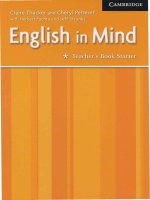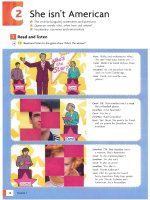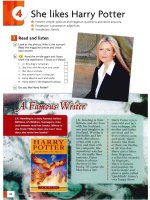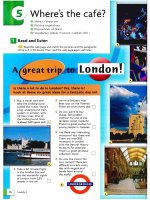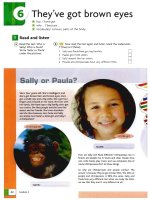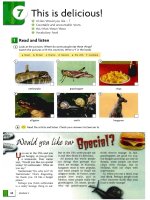english in mind2 starter level beginner teachers resource book table of contents
Bạn đang xem bản rút gọn của tài liệu. Xem và tải ngay bản đầy đủ của tài liệu tại đây (135.5 KB, 3 trang )
Cambridge University Press
978-0-521-17689-7 - English in Mind Teacher’s Resource Book Starter, Second Edition
Brian Hart
Table of Contents
More information
Contents
Map of Student’s Book
4
Introduction
6
Teacher’s notes and keys
Welcome section
10
1
2
He’s a footballer
We’re a new band
Check your progress
16
22
28
3
4
She lives in Washington
Where’s the café?
Check your progress
30
37
41
5
6
They’ve got brown eyes
This is delicious!
Check your progress
43
49
53
7
8
I sometimes watch TV
Don’t do that!
Check your progress
55
61
65
9
10
Yes, I can
A bad storm’s coming
Check your progress
67
73
78
11
12
Special days
He was only 22
Check your progress
80
87
92
13
14
What happened?
Things change
Check your progress
94
101
105
Pronunciation
Get it right! key
Projects
Workbook key
Entry Test
Entry Test Key
Teaching notes for communication
activities and grammar practice
Communication and grammar 1–14
Acknowledgements
107
111
112
114
128
132
133
142
170
3
© in this web service Cambridge University Press
www.cambridge.org
Cambridge University Press
978-0-521-17689-7 - English in Mind Teacher’s Resource Book Starter, Second Edition
Brian Hart
Table of Contents
More information
Welcome section
A Greetings
B The world, The classroom
C Things, Letters, Colours
D Asking and Answering
Unit
Grammar
Vocabulary
Pronunciation
1 He’s a footballer
The verb be (singular): statements and
questions
Question words: who, what, how old,
where?
Countries and nationalities
Vocabulary bank: countries and nationalities
from
2 We’re a new band
The verb be (plural): negatives and
questions
I (don’t) like ... / Do you like ...?
Object pronouns
Positive and negative adjectives
Everyday English
Vocabulary bank: positive and negative adjectives
/i/ and /i /
3 She lives in
Washington
Present simple: positive and negative;
questions and short answers
Possessive ’s
Possessive adjectives
Family
Vocabulary bank: family
/s/, /z/ and /iz/
4 Where’s the café?
there’s / there are
Positive imperatives
Prepositions of place
Places in towns
Numbers 100 +
Everyday English
Vocabulary bank: places in towns
/ð/ and /θ/
5 They’ve got brown
eyes
has / have got
Why ... ? Because ...
Parts of the body
Vocabulary bank: parts of the body
/v/ they’ve
6 This is delicious!
I’d like / Would you like ... ?
Countable and uncountable nouns
this/that/these/those
Food
Everyday English
Vocabulary bank: food
/w/ would
7 I sometimes
watch TV
Present simple with adverbs of frequency
Days of the week
TV programmes
Telling the time
Compound nouns
8 Don’t do that!
Negative imperatives
Adjectives to describe feelings
Everyday English
Vocabulary bank: adjectives to describe feelings
Linking sounds
9 Yes, I can
can/can’t (ability)
like / don’t like + -ing
Sports
Vocabulary bank: sports
can/can’t
10 A bad storm’s
coming
Present continuous
House and furniture
Everyday English
Vocabulary bank: house and furniture
/h/ have
11 Special days
can/can’t (asking for permission)
Prepositions: at, in, on
one/ones
Months of the year and seasons
Clothes
Vocabulary bank: clothes
/ / and /e/
12 He was only 22
Past simple: was/wasn’t; were/weren’t
Time expressions
Ordinal numbers and dates
Everyday English
Vocabulary bank: materials
was/wasn’t and
were/weren’t
13 What happened?
Past simple: regular and irregular verbs
(questions and negatives)
Verb and noun pairs
Vocabulary bank:
verb and noun pairs: make/do/take/have
-ed endings
14 Things change
Comparison of adjectives
than
Adjectives and opposites
Everyday English
Vocabulary bank: adjectives and opposites
/ðən/ than
CHECK YOUR PROGRESS
CHECK YOUR PROGRESS
CHECK YOUR PROGRESS
CHECK YOUR PROGRESS
CHECK YOUR PROGRESS
CHECK YOUR PROGRESS
CHECK YOUR PROGRESS
Pronunciation • Vocabulary bank • Get it Right! • Projects • Irregular verbs and phonetics
4
MAP
© in this web service Cambridge University Press
www.cambridge.org
Cambridge University Press
978-0-521-17689-7 - English in Mind Teacher’s Resource Book Starter, Second Edition
Brian Hart
Table of Contents
More information
Speaking & Functions
Listening
Reading
Writing
Saying where you are from
Talking about your hero
My hero/heroine
Dialogue: In a queue
Culture in Mind: heroes and heroines
Writing about yourself
Talking about likes and dislikes
Talking about singers and bands
Last but not least: asking a celebrity
questions
People talking about likes and dislikes
Song: Are We Alone?
Dialogue: members of a band
Photostory: Just a little joke
Email about your
favourite band
Talking about your family
Talking about the present
Dialogue about free-time activities
Article: America’s First Lady
Culture in Mind: British families
Paragraph about your
family
Talking about places in a town
Giving directions
Last but not least: conversation between
tourists and a local person
Asking for and giving directions
Web page: Things to see and do
in London
Photostory: A charity run
Text about your town
or city
Describing people
Giving personal information
Descriptions of people
Article: Sally or Paula?
Culture in Mind: Different cultures –
different pets
Description of a friend
or family member
Ordering food in a restaurant
Last but not least: talking about food you
like and dislike
Dialogue in a restaurant
Article: Unusual food around
the world
Photostory: Enjoy your lunch!
Email to an English
family about food likes
and dislikes
Talking about routines
Talking about TV programmes
Dialogues about TV likes, dislikes and
habits
Article: Different places – different lives
Culture in Mind: What British
teenagers watch
Paragraph for a school
magazine about the TV
programmes you like
Talking about how you feel
Last but not least: Simon says
A picture story
Song: Don’t stop
Email about feelings
Photostory: Kate looks great!
Email about your friends
and your likes and
dislikes
Talking about abilities
Talking about likes and dislikes
Amazing abilities
Conversation about sport
Article: We never win, but we always
win
Email about sport
Describing what is happening now
Talking about your house or flat
Everyday English
Last but not least: talking about a holiday
A telephone conversation about
what is happening now
Article: Round the world – alone
Photostory: A kickabout
A holiday postcard
Talking about times and dates
Describing what someone is wearing
Talking about clothes and shopping
Description of models in a fashion
show
Article: Scotland – a land of traditions
Culture in Mind: The Edinburgh
Festival
Email about a festival
Talking about the past
Last but not least: talking about when
you were young
Conversation about the Beatles
Article: The Day the Music Died
Photostory: An accident in the park
Email about a past
holiday
Asking and answering questions in
a questionnaire
Radio quiz show about historic
events
Article: She said ‘No’
Culture in Mind: The daughter of
a lion
Paragraph for a school
magazine about a
famous person from
the past
Comparing people and things in
the classroom
Describing things using adjectives
Comparing things
Last but not least: giving a presentation
about your country, comparing past
and present
Conversation comparing the 1960s
with the present
Article: From London bank to
Thailand hotel
Photostory: So sorry
Competition text
comparing life in the
past and present
MAP
© in this web service Cambridge University Press
5
www.cambridge.org


